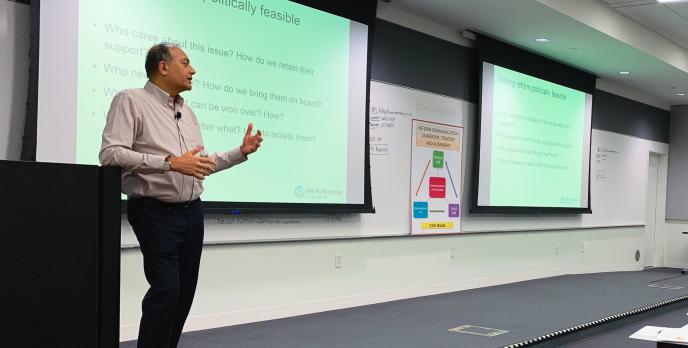Adapting locally and globally: Lessons from World Bank Director Sumir Lal

Working amidst a pandemic is hard enough on a local level, but introducing another global layer adds to the difficulty. With a collective organization like the World Bank, an international financial institution with 189 member countries, fostering relations with stay-at-home orders in place makes for a challenging communication problem. Yet, for Sumir Lal, Director for External and Corporate Relations at the World Bank based in Washington, D.C, he embraced the challenge with grace and ambition.
Advising global practices and operational units in strategic communication, reputation management, and stakeholder engagement, Lal joined the World Bank more than 20 years ago, greatly inspired by his days as an award-winning journalist in India.
“What inspired me to be a journalist was wanting to see things firsthand, to be the person on the spot to really observe and understand what is going on in society and in the world,” Lal said. “By the time I reached mid career, I got really intrigued by the intersection of politics, economics, and public policy because I realized that it's this intersection at the end of the day [that] makes things happen or not happen.”
Covering breaking news and stories like the 1987 civil war in Sri Lanka, Lal ached to get behind the scenes in drafting policies that would produce the changes he hoped to see. To further his impact, he started teaching at the annual World Bank-Annenberg Summer Institute in hopes of sharing his knowledge about his areas of focus — public policy, politics, and economics.
“One would like to share whatever experience and knowledge one has … something others can benefit from,” Lal said. “In the act of teaching and in the act of fostering those discussions … you get back something. As you share your idea that people react and respond to, you will learn something yourself.”
Teaching about the intersection of public policy and political economy, Lal underscores how crucial it is for governmental leaders to understand and comprehend these connections to create strong solutions.
Adapting to the new normal
Tackling the challenges of working remotely, Lal learned the power technology has in fostering interconnectedness on the local level.
“What the pandemic has done is that it has shown the centrality of technology in the modern world,” Lal said. “At least internally it continues to be as smooth as ever … because everything's happening virtually, in some respects access has actually become easier. It's become easier to set up conferences, or events or interactions or engagement, whatever it is you need to do.”
Lal acknowledges that not everyone has the same privilege and access to technology, raising the dire need for innovation. Since the mission of the World Bank involves funding projects that help developing countries, Lal emphasized the need to listen to the local community.
“We are having to innovate,” Lal said. “We mandate in all of our projects that whichever government agency is implementing that project has to go out and consult with the local community. It has to make sure that the community is well informed … There’s a lot of engagement that happens at the local level, and as the different countries have gone through their own lockdowns, our teams have been working out innovative ways to continue this practice.”
Though this poses a key challenge, Lal and his team use innovative approaches to technological barriers that have proven beneficial. For instance, the team was successful in creating five virtual events for the global World Bank - International Monetary Fund Annual Meetings. The virtual events were creative, fast-paced and in varied formats to address the online constraints of shorter attention spans, the difficulty making personal connections and channeling audience emotion amongst 129,000 participants.
A post pandemic change
After the pandemic subsides, Lal underscores that some aspects of the current work environment, such as technology, will continue in the future. Yet, he also emphasizes the importance of travel in an organization such as the World Bank.
“The moment when the world is back to a place where you can travel, that will come back to a large extent,” Lal said. “The reason for that is there's nothing like human face-to-face connection, and there's nothing like face-to-face communication.”
Learning the power of soft skills
By navigating global and local work through a pandemic, Lal has ultimately learned what qualities leaders must have to tackle such challenges.
“The biggest quality that this pandemic has shown that you need is empathy,” Lal said. “As a leader, you've got to be conscious of the different pressures that different members of your team are going through, and then be adaptive to that.”
Acquiring empathy and adaptability might be the first step, yet the second key step is innovation according to Lal.
“The next becomes innovation because you have to figure out how you're going to reach them and not lose touch with them,” Lal said. “You can neither be empathetic nor innovative if you aren't adaptable. These are the three big qualities that the pandemic for sure has made one aware of, and which you need to be an effective leader.”

